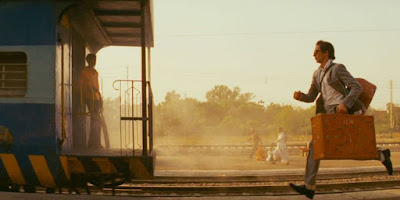Bowie's nineteenth studio album reunited him with Brian Eno, but this isn't a continuation of their work together during the late 1970s; it is indeed a separate beast. Subtitled The Nathan Adler Diaries: A Hyper-cycle, the album tells the story of a group of characters on the eve of the year 2000, some five years away at the time of release. The record marks its twenty sixth anniversary today, and helped Bowie reach the singles chart in the US for the first time since 1987.
This is not a casual listen, by any means. You couldn't load this into part of a playlist and hit shuffle, for instance. There are monologues from different characters, sub-plots and a loose narrative throughout. While 1. Outside (or just Outside, I guess) isn't one of my favourite Bowie albums, there are some great moments, and the scope and attempt at storytelling is to be applauded.After the scene-setting opening tracks depicting the character of Leon Blank going, you guessed it, outside, the detective Nathan Adler arrives. Cue album highlight The Heart's Filthy Lesson, which would go on to be used to startling effect in the movie Seven. There are numerous remixes and extended version of this song out there, but the album track is pretty damn good. The track was the first single released from the record, followed by Strangers When We Meet, another great song. This was originally written and recorded for Bowie's 1993 'soundtrack' for Buddha of Suburbia, and it's the only track that was written before Outside sessions commenced. So, the version that appears here is a new recording, and a bit more 'lush' than the 1993 one, according to the man himself. Coming at the end of the album, it feels like a breath of fresh air. As this is Bowie's longest studio offering, you've been subjected to almost seventy minutes of story and atmosphere before this arrives to cleanse your earholes. It is one of the few songs here that holds up nicely on its own, along with THFL.
The third single, Hallo Spaceboy, was actually rerecorded and remixed in early 1996, and featured the Pet Shop Boys. I have vague memories of seeing the video clip on Rage at the time. I think it may have been the first time I saw a new Bowie video since the eighties. I remember liking it, and thinking it was quite poppy. I thought it was cool that Major Tom was being referred to again. The version on the album is quite different. There are no Pet Shop Boys. The melody remains, but instead of a radio-friendly pop production, it borders on an industrial thudding assault. It is more inline with the rest of the record, than the single release, and works really well among the other tracks. Stands nicely on its own though. If you see any live performances of the song, you'll have flashing lights accompanying the constant thud. Kinda cool though.
There are a few other highlights on the album for me. The Motel got a guernsey on the A Reality Tour on some nights, which is an interesting choice. Without the context of the album, it exists as an eerie character piece. I really like the repeated adage of "there's no hell like an old hell" though. Big on atmosphere and mood, it's not a tune you can easily sing along to, and it's certainly not a stadium anthem either. So, I don't know how well received those live performances were, he he he. I also quite like I'm Deranged, but that's probably due to its usage in David Lynch's eccentric but brilliant Lost Highway.
As I mentioned earlier, Strangers When We Meet is the only song that had been written before Bowie and Eno began recording. Joining them were guitarists Reeves Gabrels and Carlos Alomar, bassist Erdal Kızılçay, pianist Mike Garson and drummer Sterling Campbell. Additional contributions were made by jazz drummer Joey Baron and Israeli bassist Yossi Fine.
In addition to his duties as a co-producer and instrumentalist, Eno is also credited with providing strategies, using flash cards and word randomisers with Bowie to help create characters and songs that didn't rely on clichés. This is a dense, long listen. There is a short essay in the liner notes that help scope out the loose plot of a murdered baby and the people that come in and out of the story. Some of the characters are portrayed by Bowie putting on accents or having his voice manipulated with various effects. As you would probably guess, with it being fully titled 1. Outside - The Nathan Adler Diaries: A Hyper-cycle there was a plan to release another album in the same vein. Ideas from Bowie included putting out an album each year until 2000 and have the music line up with the present, or releasing a trilogy. None of those concept came to fruition.
So, there is some good, and some bad, the length being the biggest obstacle. One wonders if the bits of narration were removed along with the mood-setting pieces, there would remain a tighter album with some strong songs. Imagine an album that kicks off with The Heart's Filthy Lesson... It would be a shame to lose those characters and that created world though.
NEXT UP: Hours... - 4th Oct






